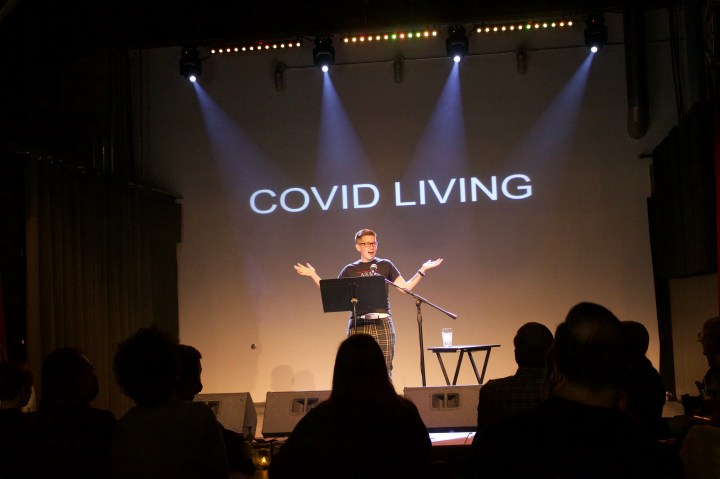
Struggling venue operators can finally seize the federal government’s lifeline
Struggling venue operators can finally seize the federal government’s lifeline

The Shuttered Venue Operators Grant, or SVOG program, part of the federal government relief bill passed in December, finally got up and running this week after a failed launch earlier in April.
It’s a late but welcome lifeline for theaters, live events spaces and other arts venues that were shut down entirely for much of the past year. More than 17,000 of them applied in the first 24 hours the Small Business Administration’s application portal was open.
Tobi Parks, who runs a small nightclub in Des Moines, Iowa, called xBk, is one of the business owners who applied. She spoke with “Marketplace” host Kai Ryssdal about reopening her venue after a year of almost no revenue. The following is an edited transcript of their conversation.
Kai Ryssdal: So you got your grant application in this week, did you?
Tobi Parks: We absolutely did. We’re so excited to be able to see some revenue coming through the pipeline now. So that’s fantastic.
Ryssdal: Tell me what that revenue is going to mean for you, because it has been for you and tens of thousands of other venue operators, a long haul.
Parks: It really has. I mean, it’s the difference between death and survival, you know, in terms of our industry. Without it, you know, we certainly, it would have been very catastrophic. We’ve had no revenue for a year, and we have, you know, nothing to work with. And so now, you know, with the SVOG applications in, you know, we know that the SBA is working diligently to get everybody funded, the hope is we can get back in there, and we can compete again,
Ryssdal: I’m going to show my naivete about the music industry — is Des Moines a go-to place for touring acts?
Parks: Well, we want it to be. But really, you know, we’re a connector city. We’re the spot that people go to from Minneapolis to Denver, or Chicago to Kansas City. And really, that’s been one of the toughest things with how things have been going with reopening. Each market is opening in different ways. In Iowa, we’re completely open. And other states, they have different opening timelines, and that makes it really difficult for artists to be able to effectively route their tours because it’s not going to be lucrative for an artist to come all the way to Des Moines and just play Des Moines without being able to also play those other larger markets that can really help fund their tour.
Ryssdal: So you’ve been open now for a number of weeks, right? You do one live show a week. What does it look like at xBk on a Friday night when people come?
Parks: You know, people are just elated to be there. I think people have been so cooped up in their homes and haven’t been able to get out. And we really wanted to kind of catch up on our paces too of even just how to run the building again. And so [we’re] kind of dipping our toe in the water with the very small audiences. The first week, we started with 25, the next week we went up to, you know, 30, the week after that —
Ryssdal: Is that people or percent?
Parks: People.
Ryssdal: Oh, wow. Out of like a 250-person house, right?
Parks: Correct, correct. Yeah. I mean, you know, technically by, you know, Iowa standards, you know, we could be open and, you know, that there’s no capacity limit there anymore. But for us, you know, we want to make sure that people come into our venue, that they feel safe, and to really just give this joy to people, because I can’t tell you like how amazing it’s felt coming in, and the artists getting to perform for the first time in a year. Every artist has had a multiple-song encore because people just don’t want to go home. So it’s a really wonderful feeling to be back at it again.
Ryssdal: I hate to bring you down from that great image of the artistic high there, but let me ask you the business question: Are you making any money?
Parks: We are breaking even on the shows themselves. We’re not able to cover any of our overhead with these shows, but we’re able to cover our staff costs and pay the artists a little bit. The way that we look at it is we’re going to either be closed or we can just break even and give people a little bit of joy and something to look forward to. So we opted to try and dip our toe in the water and go for the latter option.
There’s a lot happening in the world. Through it all, Marketplace is here for you.
You rely on Marketplace to break down the world’s events and tell you how it affects you in a fact-based, approachable way. We rely on your financial support to keep making that possible.
Your donation today powers the independent journalism that you rely on. For just $5/month, you can help sustain Marketplace so we can keep reporting on the things that matter to you.












